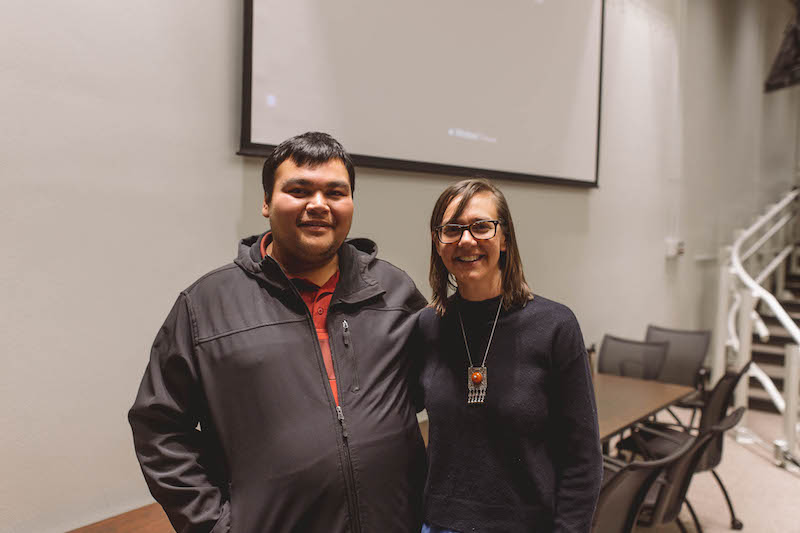Author Shiri Pasternak and band councilor Norman Matchewan from Barriere Lake gave a speech for the newly released book Grounded Authority: The Algonquins of Barriere Lake Against the State. Photo by Kirubel Mehari.
Author Shiri Pasternak releases her book Grounded Authority: The Algonquins of Barriere Lake Against the State
Four hours northwest of Montreal, you’ll find the Algonquins of Barriere Lake, an Indigenous community of about 450 people. It’s a community that has long fought with the provincial and federal governments for their rights and their land. Shiri Pasternak, an associate professor of criminology at Ryerson University in Toronto, tells their story in her new book, Grounded Authority: The Algonquins of Barriere Lake Against the State.
The book was launched at McGill University on Oct. 11, with a speech given by Pasternak herself. She was joined by Norman Matchewan, a band councillor and community leader from Barriere Lake. In her book, Pasternak discusses the fight of the Algonquins of Barriere Lake from the point of view of Indigenous law and jurisdiction. “The book draws an analytic thread through the early colonial aperture between sovereignty and jurisdiction to the present day,” Pasternak said. She elaborated that the book chronicles the continuous evidence showing that state control over Indigenous lands only leads to a struggle between the two groups.
Pasternak started working with the Algonquins of Barriere Lake because of Russell Diabo, a Mohawk policy analyst and activist who explained to her that, in order to understand colonialism in Canada, she needed to understand the experiences of this community. In 2008, she began working in the community, and in 2012, she started writing her book.
The story of the Algonquins of Barriere Lake is a long and complicated one that concerns territory jurisdiction for the most part. It’s closely tied to the fact that the band lives on unceded territory, which means the land has never been surrendered to nor acquired by the Crown. In these cases, the federal government uses the Comprehensive Claims Policy to deal with Aboriginal and land rights “that have not been dealt with by treaty or other legal means.” The Algonquins of Barriere Lake have resisted this policy as it would force them “to cede their title to the land, forcing them to give up rights to 95 per cent of their land and accept provincial jurisdiction over their lands and territories,” according to Pasternak.
In 1991, to avoid the Comprehensive Claims Policy, Jean-Maurice Matchewan, the community’s band councillor at the time, and Norman’s father, signed a trilateral agreement with the federal and provincial governments. It’s a resource co-management agreement of the 10,000 square kilometres to “harmonize Algonquin land use with settler land use based on Indigenous land use, consent and decision making,” Pasternak explained. It would be funded by the federal government so the Algonquins of Barriere Lake would not have to take on loans, and they would make a modest revenue from any resource extraction on the land. According to Pasternak, however, neither government has abided by this agreement, even going so far as to deny its legitimacy.
This neglect is an “instance of how legal authority is established far from the courts and in a way that, nonetheless, shapes the boundaries of settler law: where it will have power, how it will have power, whether it will have power,” Pasternak said. Matchewan explained that the Algonquins of Barriere Lake’s values are about caring, loving and respecting the land and its stories. Even the Algonquian language is closely related to the wildlife and the land they live on, he said. Pasternak commented that this community’s fight is about the right to live and have food on their table—it’s not about the right to property or private ownership.
The book documents the accounts of all the forms of deception and coercion used by the federal and provincial governments. “In my book, I name all the bureaucrats, politicians, accountants and lawyers who terrorized these Indigenous people trying to defend their land from exploitation,” Pasternak said.
In 1995, as a way to withdraw from the trilateral agreement, the department of Indian Affairs debated the use of section 74 of the Indian Act, which imposes an elective system on the community, rather than a system of nomination. In 2009, the department sent a notice to the Algonquins of Barriere Lake explaining that the government would not recognize their customary form of government and imposed section 74. The way the Algonquins’ customary government works is that the elders of the band select the councillors by observing them from a young age, Matchewan explained. Grounded Authority shows that the conflict is about “whose laws will apply and on what grounds,” Pasternak said.
She shared a story about when the band councillors were negotiating with Copper One, a company that wanted to begin a mining exploration on their reserve last winter. While Matchewan was explaining that the company needed the consent of the families responsible for the land in question, the Copper One representative tried to bribe Matchewan into taking a 50 per cent share in the company, according to Pasternak. Since then, the Quebec government has refused to grant the company the necessary logging permits to bring equipment to the territory.
On Oct. 11, Matchewan announced the band would be signing a new trilateral agreement on Oct. 13 after 26 years of fighting. “We’ve endured hardship to battle the Indian Affairs Act. We blockaded, we were criminalized, we were shot at with tear gas and pepper spray […] It’s up to us to continue to fight,” Matchewan said.
Pasternak described the book as an expression of her deep respect for the community and their determination to protect their land. It’s a tribute to the Algonquins’ relationship with the land and the times they had to stay out in the cold to maintain their rights.
Find Shiri Pasternak’s book Grounded Authority: The Algonquins of Barriere Lake Against the State at: https://www.upress.umn.edu/book-division/books/grounded-authority.




